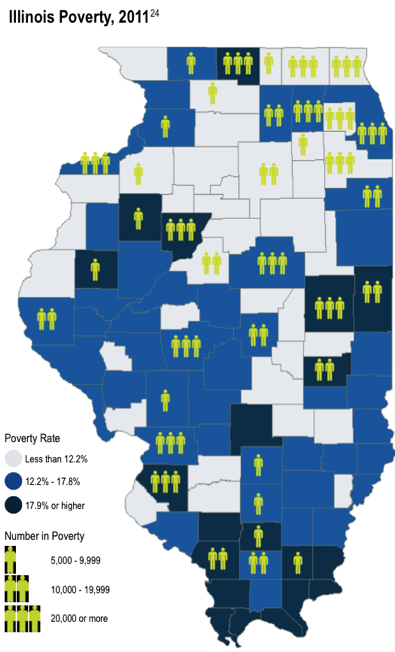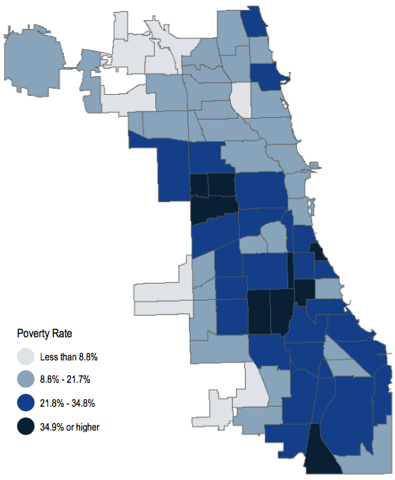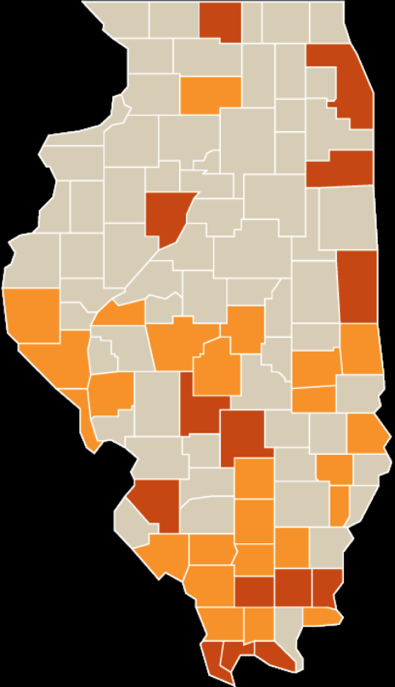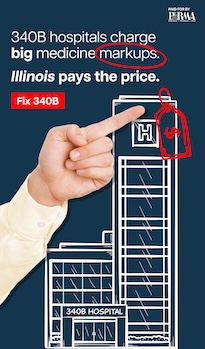Today’s maps: Illinois poverty
Thursday, Jan 17, 2013 - Posted by Rich Miller
* From a new Heartland Alliance study of Illinois poverty…

* Chicago neighborhood poverty rates…

* And then there’s the County Well-Being Index…
The County Well-Being Index highlights counties that are experiencing particularly negative conditions and trends on four key indicators: poverty, unemployment, teen births, and high school graduation.
Counties in Illinois are evaluated using a point system, with a higher number of points indicating a worse score. A county receives a point if its rate is worse than the state average and/or if it has worsened since the previous year.
Light orange counties are on the Poverty Watch List. Dark Orange are on the Poverty Warning List…

* Other stats from the report…
Nearly half of all private sector employees in Illinois don’t have access to paid sick leave, which poses particular challenges for women with caregiving responsibilities.
Since the recession began, the number of homeless students enrolled in Illinois public schools has increased 48%.
Over half of all private sector workers in Illinois lack access to an employment-based retirement plan, and lower-wage workers are the least likely to have access.
* Coverage…
* One in three Illinois residents in or near poverty, according to Heartland Alliance report
* Illinois Poverty Rate 2012: One-Third Of State’s Residents Considered Poor According To New Report
* 1 in 3 Illinoisans lives in or near poverty level: report

















- Caveman - Thursday, Jan 17, 13 @ 12:26 pm:
Interesting to see the hardest hit areas are generally border counties. Seems to support the idea that small business is not doing well in Illinois when faced with competition across the border.
- Irish - Thursday, Jan 17, 13 @ 12:35 pm:
It is interesting and very revealing that the serious poverty crosses many lines. You have the Rockford area high population, urban. The Pembroke area, more rural, less people, but not too far from a metro area. And then the very rural areas of deep southern Illinois. And not much in common either I would say. And the causes are I would expect equally divergent. It makes finding a solution most difficult
- Aaron Krager - Thursday, Jan 17, 13 @ 12:36 pm:
@caveman - it would have a lot more to do with the fact that is where the biggest cities in Illinois are located.
- wordslinger - Thursday, Jan 17, 13 @ 12:39 pm:
Caveman, a see a lot of blue counties in the middle of the state. And a lot of grey ones on the edges.
I don’t know if there’s any simple takeaway. Rural poverty has some different dynamics than urban poverty, but it’s an issue all over.
- Rich Miller - Thursday, Jan 17, 13 @ 12:40 pm:
===Interesting to see the hardest hit areas are generally border counties.===
Well, we have a huge border.
But, more importantly, Adams County has been a remarkable success. It has consistently low unemployment, high business success and low poverty rates, despite being on a border.
The state ought to be looking to see how and why Adams County (Quincy is the biggest town) is so very successful. Maybe some of what they do over there can be replicated elsewhere.
- steve schnorf - Thursday, Jan 17, 13 @ 12:40 pm:
and we continue to long for Lake Woebegone, where everyone can be above average (I know I cheated a little bit here). And take a look at such high poverty areas as Champaign county, or even Coles, or Jackson; anyone see cause and effect there?
- Third Reading - Thursday, Jan 17, 13 @ 1:14 pm:
Thanks much, Rich, for pulling together this incredibly sobering post.
The charades (blather? shell games?) that pass for budgetary and financial deliberations in this state almost always seem to grind the neediest among us deeper into poverty.
I’ll leave the morality of that aside, at least for now.
From a purely public policy standpoint, there’s a certain callous wisdom in raising people up. More educated and healthy and prosperous citizens increase the overall tax base - while simultaneously spreading individual tax burdens.
I, for one, still hope that we can muster the collective courage to help the hungry and sick and desperate living among us.
For those who may be interested, C-SPAN is carrying a live symposium called “Vision for a New America: A Future Without Poverty” this evening at 5:30 PM Central time. For more information, see http://www.c-span.org/Events/Tavis-Smiley-Hosts-Symposium-Vision-for-a-New-America/10737437312/
I’m outta here.
- 47th Ward - Thursday, Jan 17, 13 @ 1:39 pm:
===And take a look at such high poverty areas as Champaign county, or even Coles, or Jackson; anyone see cause and effect there?===
College students? They don’t have huge incomes, and the federal poverty line is $11,000 for a single household. I couldn’t find out from the report if they controlled for this, so I have no idea really. Jackson and Coles make some sense, but I didn’t expect Champaign to be on the list.
- Formerly Known As... - Thursday, Jan 17, 13 @ 1:45 pm:
=== continue to long for Lake Woebegone, where everyone can be above average ===
At this point, I’d settle for the “good old days” with a state poverty rate under 14%.
1992 was the last time we breached that point. Then it dropped to 13.6% in 1993 and 12.4% in 1994.
Unfortunately, Illinois topped 14% in both 2010 and 2011. Don’t see the 2012 data yet.
- jerry 101 - Thursday, Jan 17, 13 @ 1:47 pm:
actually Rich, it looks like Adams County is colored Blue, and has 10 to 20k in poverty, and is on the ‘watch list,’ which seems like it’s not as rosy as you seem to make it out to be.
Overall, it looks to like the maps (and the report - Read through the report) show that poverty is everywhere in Illinois, and is a problem growing at a dramatic rate. While a lot of the darker blue counties are areas with some of our larger cities, the heavy sprinkling of blue in a fair number of very rural counties, especially down south, not to mention plenty of counties with smallish cities, shows its not just an urban problem.
- davidh - Thursday, Jan 17, 13 @ 2:05 pm:
Thank you for posting about this study. It’s a very sobering study and shows how conditions for many people in Illinois have been eroding since the bottom fell out of the economy in 2008. While there are undoubtedly state and local policies that have an impact on this, what’s really at work are underlying trends that are national in scope: the collapse in manufacturing (read what the report says about job growth being concentrated in the lower-wage service sector) and widening income inequality. The sad thing is that the state’s pension-driven fiscal problems really are squeezing out (no irony intended) it’s ability to do proactive things about it. Watching state support for education drip away surely isn’t helping this problem.
Thanks again for covering this. The most staggering finding in this study is that fully 1/3 of the state’s population, 4.1 million people, are at or near poverty. This isn’t an issue that affects them, over there in that neighborhood or in that county. It is everywhere and it is a big problem that deserves more attention.
- Endangered Moderate Species - Thursday, Jan 17, 13 @ 2:07 pm:
“Seems to support the idea that small business is not doing well in Illinois when faced with competition across the border.”
Caveman- It is interesting that you can make such a strong conclusion with so few variables to consider. The following site shows 2009 poverty levels in rural counties throughout the nation. The 2009 numbers indicate that poverty does not consider State boundaries. Good try on your political slant but the rest of us are many generations past the invention of the wheel and the discovery of fire.
http://irjci.blogspot.com/2010/12/poverty-still-high-getting-higher-in.html
- steve schnorf - Thursday, Jan 17, 13 @ 3:59 pm:
Bingo, 47
- wishbone - Thursday, Jan 17, 13 @ 5:45 pm:
Income inequality and climate change are the two major problems threatening our state, our nation, and the world. Yet neither is the focus of our policy makers.
- western illinois - Thursday, Jan 17, 13 @ 6:17 pm:
Right Wishbone and yes I recall in previous reports they mentioned that fact . It explains Mc Donough. Galesburg has gone from over 6000 manufacturing jobs in the sixties to less than 1000. Galesburg has been the deindustrailiazation poster child for decades.
I wish we could juxtapose this with the NYTs map of the top 1% income cut off. Peoria is exactly the national average of 300,000. Its a major corporate center and medical center . There are those plus 100k jobs. The major corp is one that has managed to really cute and outsource even within Illinois partly explaining why the top 1 is average and its inequality.
The QCs have fewer top ones and less ineqaulity